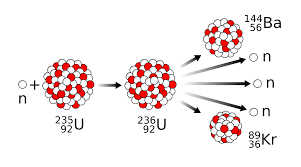The splitting apart of U-235 is defined as...
Nuclear Fission
This type of radiation has a charge of -1
Beta Particle
The spontaneous emission of radiation from unstable atomic nuclei.
Radioactivity
True or False: The result of radioactive decay is a more stable nucleus
True

22286Rn
Nuclear Fusion
When released during radioactive decay, this type of particle changes the atomic number by 2 and the mass number by 4.
Alpha Particle (Helium Particle)
The conversion of one atom of an element to an atom of another element
Transmutation
Write the isotope symbol for Te-130
13052Te

0-1e
What subatomic particle is primarily responsible for causing chain reactions involved in fission?
Neutrons!

Illustrate a positron.
0+1e
Subatomic particle with a +1 charge
proton
True or False: Chemical Reactions allow an atom one element of to turn into an atom of another element.
False
The half-life of Zn-71 is 2.4 minutes. If one had 100.0 g at the beginning, how many grams would be left after 7.2 minutes has elapsed?
7.2 / 2.4 = 3 half-lives
12.5 g remaining
Both Fission and Fusion reactions release massive amounts of energy in the form of heat and gamma radiation. However, one of these two is more energetic than the other. Which process, fission or fusion releases more energy?
Fusion! It's what powers the sun and why hydrogen bombs are MUCH more scary than uranium bombs.
Type of radiation that can penetrate through paper, wood and is stopped by concrete and lead.
Gamma radiation
The penetrating rays and particles emitted by radioactive sources.
Radiation
True or False: Nuclear Reactions can be sped up, slowed down, or stopped.
False
Carbon-14 emits beta radiation and decays with a half life of 5,730 years. Assume you start with 100g of Carbon-14.
How much carbon is left after 4 half lifes?
What is 6.25g
In the sun, ______________ atoms fuse together to create ______________ atoms, which produces a bunch of energy.
Hydrogen
Helium
Put the three most common types of Nuclear Decay in order from least penetrating to most penetrating.
Alpha Decay
Beta Decay
Gamma Decay
The time required for one-half of the nuclei of a radioisotope sample to decay into a new element.
Half-life
What is the last stable element on the periodic table of elements?
Lead (82 atomic number)/Bismuth (83 atomic number)
Any element above 82/83 tends to be unstable and thus radioactive.
The alpha decay of Fr-211 results in:
He + At-207